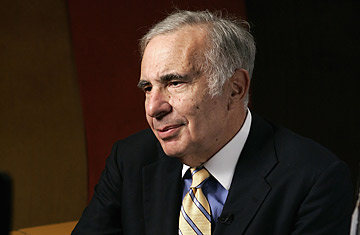
Financier Carl Icahn
As corporate raider Carl Icahn fights to wrestle control of filmmaker Lions Gate Entertainment, it's easy to overlook his other big bet — on the betting business.
The billionaire investor has taken control of 10 casino properties in the past three months and is currently vying for three more. He grabbed control of nine Tropicana Entertainment casinos, including the Tropicana in Atlantic City, acquired the partly built Fontainebleau megacasino in Las Vegas and is currently in a contentious bidding war with Donald Trump for control of three Trump-branded casinos in Atlantic City.
It all comes down to price, valuation and long-term potential returns, says Icahn. But he quickly emphasizes that he isn't expecting a speedy bounce back in the battered sector.
"I like to wait and buy things when nobody wants them — that's when you get the best values," says Icahn, who made his investments through bankruptcy-court proceedings. But he cautions that the sector still holds considerable risk and that a rebound could be many months or even years away. "Only a fool will tell you they can pick the bottom," he says.
So how far off is the bottom? "There's certainly going to be rough sledding ahead in the casino industry — Vegas is overbuilt and Atlantic City has its problems with a lot of [regional] competition. That's precisely why they're selling at the values they're selling at," says Icahn.
Still, many investors and analysts are eyeing Icahn's move closely. Some wonder if his move into the sector is a sign to start putting investment chips back on the table and roll the dice on companies with big exposure to the U.S. gaming market. "[Carl Icahn] has always been a very astute investor," concurs Clyde Barrow, a casino expert and professor at the University of Massachusetts at Dartmouth. "There's a lot of upside potential, and if you're investing for the long term, now is the time to buy."
"It definitely could be a sign that valuations are at or near record low levels," says Janet Brashear, a senior analyst at Sanford C. Bernstein & Co. However, she cautions it will likely be 2011 before the market stabilizes and 2012 before it rebounds.
Icahn has earned accolades on Wall Street for his savvy stock-picking choices, knack for launching feisty board battles at poorly performing companies and, most importantly, his ability to snap up unwanted, undervalued or mismanaged companies at bargain-basement prices and turn them around for big profits.
As an example, one of Icahn's biggest windfalls came from an investment in cancer-drug maker ImClone Systems. The corporate raider jumped into the stock in 2006, launched a nasty proxy fight, strong-armed the board into rejecting a $36-a-share takeover offer and assumed the post of chairman. Two years later, the company accepted a $70-a-share bid from Eli Lilly & Co. "I felt vindicated," boasted Icahn at the time. Then there was National Energy Group, where he turned a $300 million investment in the company in 2003 into a $1.5 billion payoff when it was sold in 2006, according to Icahn.
But not every investment has been a home run. Icahn jumped into video-rental company Blockbuster in 2005 when its shares were trading at between $9 and $10 apiece. They recently changed hands at 30 cents a share — Icahn remains a major stockholder — and the company indicated in a recent filing it will likely file for bankruptcy protection.
Still, Icahn's recent foray into the gaming sector is grabbing investors' attention.
The sector has taken a huge hit over the past two years, as the crippling recession, the pullback in business travel, frozen credit markets, the decline in consumer spending and even President Obama's "anti-Las Vegas" comments took a hefty toll on casino companies. Gaming revenue plummeted and a flurry of companies, such as Herbst Gaming, Trump Entertainment and Station Casinos, filed for Chapter 11 bankruptcy protection. Stocks nose-dived, with major names losing more than 85% of their value from their October 2007 peak.
